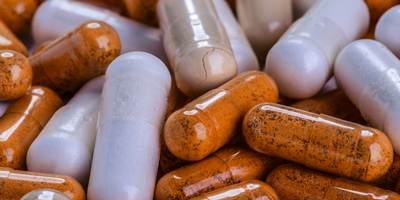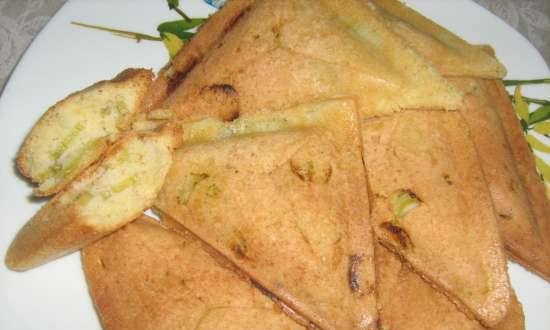|
 It has long been known that probiotics are great for strengthening the immune system and normalizing bowel function. However, for all their fame, not everyone knows that probiotics are ineffective without their lesser-known partner - prebiotic, or rather, prebiotic fiber. Let's try to understand what prebiotic fiber is, how it helps probiotics, and why it should be included in the diet. It has long been known that probiotics are great for strengthening the immune system and normalizing bowel function. However, for all their fame, not everyone knows that probiotics are ineffective without their lesser-known partner - prebiotic, or rather, prebiotic fiber. Let's try to understand what prebiotic fiber is, how it helps probiotics, and why it should be included in the diet.
What is Prebiotic Fiber?
The word "prebiotic" is a fairly new concept (the term came into use only in 1995), but prebiotics themselves are not new. Prebiotics are a difficult-to-digest form of fiber found in some fruits, vegetables, and starches. Prebiotics are a food source for beneficial bacteria in the large intestine. It is important to note that every prebiotic is a fiber, but not all fibers can be classified as prebiotics.
Fiber should be considered "prebiotic" when it meets the following criteria:
They are not digested or absorbed in the upper gastrointestinal tract.
Fermented by microflora in the colon.
They stimulate the growth or increase the biological activity of the intestinal microflora.
The relationship between prebiotics and probiotics
Prebiotics and probiotics are inextricably linked with each other. Prebiotic fiber is the main food source probiotics... Probiotics themselves cannot exist without prebiotics. Consuming a probiotic prebiotic fiber supplement places the indigestible prebiotics in the intestines, where the probiotics feed on them. This allows beneficial bacteria to colonize the intestinal microflora. Conversely, if probiotics used separately from prebiotics, their positive effect will be significantly reduced.
The beneficial properties of prebiotics
Despite the fact that prebiotics were not previously known, their properties are now well understood.
We present to your attention some of the beneficial properties of prebiotics and their effect on human health.
Improves intestinal motility
In the course of the study, it turned out that prebiotics and probiotics stimulate the digestive system. This is just one of many studies showing that prebiotic fiber is essential for gut health. The findings are published in The Journal of Nutrition.
 Strengthens bones Strengthens bones
According to the British Journal of Nutrition, prebiotic fiber improves the absorption of minerals in the body, including magnesium and calcium, which are essential for bone health.
Supports the cardiovascular system
Prebiotics have a positive effect on lipid metabolism and have a beneficial effect on the functioning of the cardiovascular system.
Helps control appetite and weight
Research published in the British Journal of Medicine and American Journal of Clinical Nutrition has shown that prebiotics help control appetite by increasing hormones that are responsible for feeling full, thereby suppressing hunger.
Regulate insulin sensitivity
The Journal of Nutrition reports that consuming 15-30 grams per day of resistant starch (a type of prebiotic fiber) reduces insulin sensitivity in overweight people.
Affect the work of the brain
In the field of neurobiology, prebiotics are a type of "psychobiotic" that has a beneficial effect on gut bacteria and significantly affects the functioning of the gut-brain axis.
Improves mental and emotional health
Experimental results in humans and animals have shown that prebiotic fibers support normal mental and emotional health and reduce the negative effects of stress on the body.
Provide restful sleep
Scientists from the University of Colorado conducted animal studies and found that regular consumption of prebiotics increases the duration of deep (Non-REM) and superficial sleep (REM) after suffering stress.
Types of prebiotics
Prebiotics can be found both in foods and supplements.
Prebiotic fiber is found in the following foods and supplements:
Acai berry chewing gum
Inulin
Lactulose
Lafinoza
Oligosaccharides (the best known prebiotics), including:
Fructooligosaccharides (FOS)
Oligofructose (OP)
Galactooligosaccharides (GOS)
Transgalactooligosaccharides (TOC)
Polydextrose
Plantain
Resistant starch (CC)
Wheat dextrin
While the debate continues over which prebiotics are most beneficial, it is clear that the use of any prebiotic with probiotics is of particular value.
What is a prebiotic supplement?
In the distant past, people ate plant foods rich in prebiotics and dietary fiber. If you do not adhere to this tradition and do not consume enough foods containing prebiotics, then prebiotic supplements can fill these gaps.
Currently, prebiotics are available as a standalone supplement or in combination with a probiotic formula to enhance potency. You can use a combination product or a pure prebiotic depending on your goal. Keep in mind, probiotics are best taken with prebiotics (as a supplement or in foods).
Best Prebiotic Foods to Eat
Since "prebiotics" is a relatively new concept in the health field, there are some controversial questions about which foods are "prebiotic" and which are not. Some experts claim that any fiber containing foods have prebiotic properties. This is most likely true. We turn your attention to the best recognized prebiotic foods.
Asparagus is fibrous in structure.
Bananas - Contains significant amounts of resistant starch when slightly unripe.
Chicory root - Rich in inulin. Quite a popular product among probiotic manufacturers. Chicory root is also used as a coffee substitute.
Garlic is great for supporting your immune system and gut health.
The Jerusalem artichoke, also known as Jerusalem artichoke, is a delicious potato tuber packed with prebiotic fiber.
Leeks have many beneficial properties, including prebiotics.
Onions are essential for maintaining the immune system and gut health.
Potato Starch - Widespread in grocery stores due to its high content of resistant starch.
Soybeans - Whole soybeans are a good source of prebiotic fiber. If you love soy, eat it in moderation and look for natural fermented soy foods like tempeh and miso (non-GMO).
Whole Grain Corn - Use natural (non-GMO), sprouted corn products.
Whole grains like oats.
It is important to note that prebiotics are found in high amounts in breast milk. They create the best conditions for the growth and reproduction of beneficial gut bacteria, in particular, protecting babies from infections.
How many prebiotic foods should you eat daily?
A dietitian can help you determine the right diet based on your health condition and goals.Based on current research, we recommend consuming at least one or two prebiotic-rich foods per day to support gut health. This is in addition to foods that are already rich in fruits and vegetables that contain prebiotics. Eat soups with onion and garlic, substitute Jerusalem artichoke for potatoes, and add bananas or resistant starch (like potato starch) to smoothies. Be sure to make sure your probiotic supplement contains prebiotic fiber.
Prebiotics: summing up
As a reminder, prebiotic fiber is the main food source for probiotics. Probiotics cannot exist in the gut without prebiotics. Prebiotic supplements should be taken alone or in combination with a probiotic like FloraTrex. FloraTrex combines 23 different probiotics with the right amount of prebiotics to keep your gut healthy.
Are prebiotics in your focus? How well do you understand them? Leave a comment below and share your thoughts with us.
reference Information
Treatment results may vary. This information has been prepared for educational purposes and is not intended to override the advice of your PCP. The Global Health Center does not advise, prescribe drugs, or diagnose illness. Opinions and nutritional advice do not preclude a medical examination. If you have a serious illness or health problem, see a specialist.
N.V. Naumchik
|
 It has long been known that probiotics are great for strengthening the immune system and normalizing bowel function. However, for all their fame, not everyone knows that probiotics are ineffective without their lesser-known partner - prebiotic, or rather, prebiotic fiber. Let's try to understand what prebiotic fiber is, how it helps probiotics, and why it should be included in the diet.
It has long been known that probiotics are great for strengthening the immune system and normalizing bowel function. However, for all their fame, not everyone knows that probiotics are ineffective without their lesser-known partner - prebiotic, or rather, prebiotic fiber. Let's try to understand what prebiotic fiber is, how it helps probiotics, and why it should be included in the diet.






